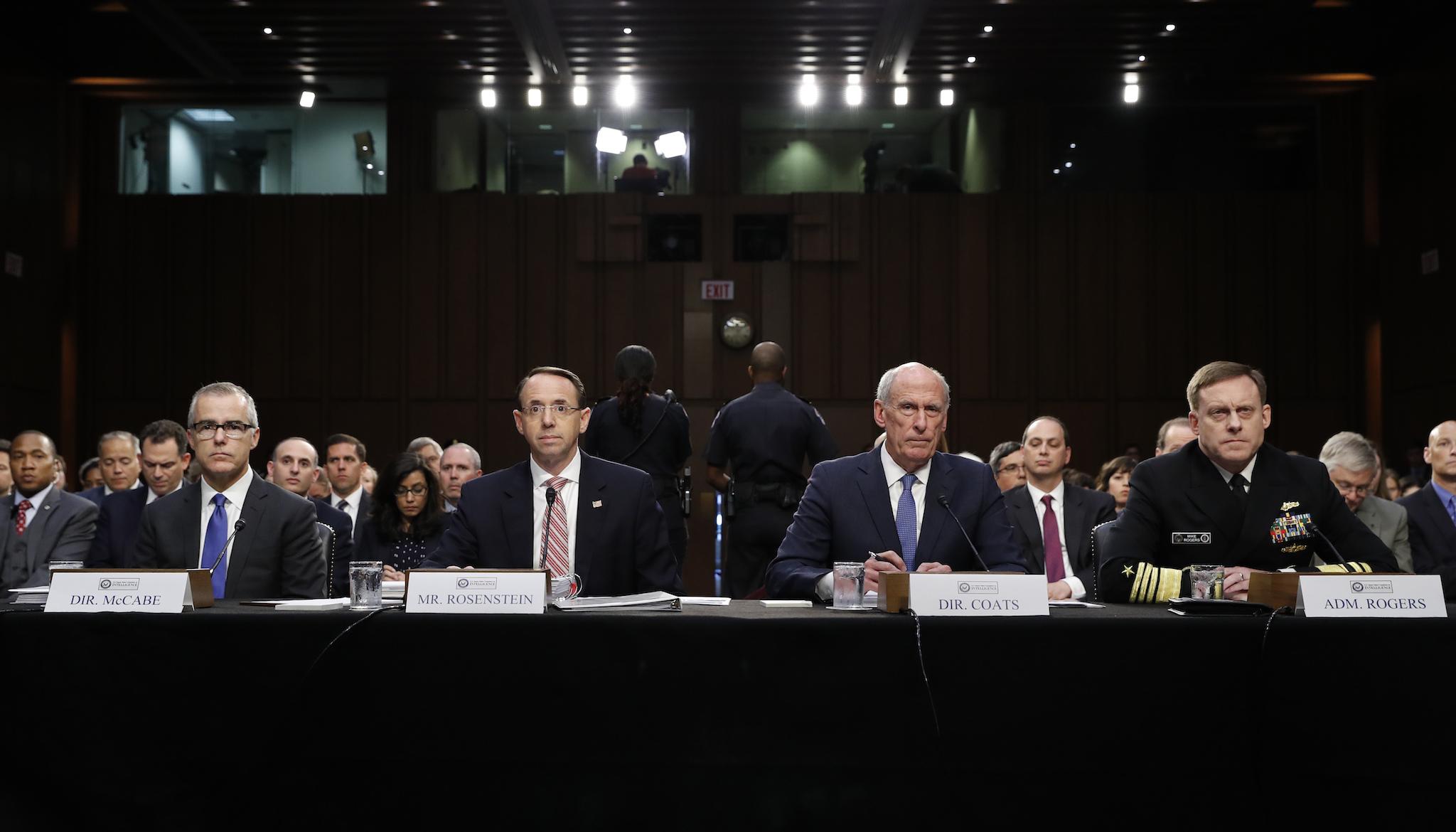US intelligence chiefs attacked for refusing to answer Trump-Russia questions: 'What you feel is irrelevant'
Donald Trump reportedly appealed to intelligence officials to downplay the Russia investigation.

Your support helps us to tell the story
From reproductive rights to climate change to Big Tech, The Independent is on the ground when the story is developing. Whether it's investigating the financials of Elon Musk's pro-Trump PAC or producing our latest documentary, 'The A Word', which shines a light on the American women fighting for reproductive rights, we know how important it is to parse out the facts from the messaging.
At such a critical moment in US history, we need reporters on the ground. Your donation allows us to keep sending journalists to speak to both sides of the story.
The Independent is trusted by Americans across the entire political spectrum. And unlike many other quality news outlets, we choose not to lock Americans out of our reporting and analysis with paywalls. We believe quality journalism should be available to everyone, paid for by those who can afford it.
Your support makes all the difference.Democrats have attacked US intelligence officials for refusing to answer questions publicly about whether Donald Trump asked them to influence an investigation into whether the President's campaign advisers colluded with Russian officials.
In a contentious Senate Intelligence Committee hearing, Admiral Michael Rogers, head of the National Security Agency (NSA), and Mr Trump’s intelligence director Dan Coats said they did not feel that it was appropriate to comment in an open session on classified conversations they have had with the President.
Senator Angus King, an independent who caucuses with the Democrats, asked on what legal basis the officials were not answering certain questions.
“I feel it is inappropriate, Senator,” Mr Rogers said.
“What you feel isn’t relevant, Admiral,” Mr King retorted.
Media outlets have reported that Mr Trump separately appealed to Mr Rogers and Mr Coats to downplay the Russia investigation. The President also reportedly asked the intelligence director if he could intervene with then-FBI Director James Comey to get the bureau to pull back its inquiry into former national security adviser Michael Flynn.
The hearing came a day before Mr Comey, fired by Mr Trump last month, is also set to openly testify before the Senate committee. Mr Comey is expected to reveal whether the President asked him to drop the bureau's probe into Mr Flynn.
Mr Flynn resigned in February after it was revealed that he had misled Vice President Mike Pence and other top White House officials about his conversations with Sergey Kislyak, the Russian ambassador to the US.
The White House has dismissed the memo as inaccurate.
Despite contending that they could not publicly discuss their interactions with the President, both Mr Rogers and Mr Coats said they had never felt pressured to intervene in an investigation. But they would not comment on whether Mr Trump had asked them to do so.
Mr King pushed back, asking for the legal basis for why the intelligence chiefs couldn't respond to this question. He also asked if it was because Mr Trump had invoked executive privilege.
Mr Rogers responded that the President had not.
Both Mr Rogers and Mr Coats – who said he didn’t know if he had a legal basis for not responding – asserted that they would be willing to answer senators’ questions more directly behind closed doors on Wednesday afternoon.
But the officials said that they would first check with legal counsel at the White House to make sure the President did not intend to invoke executive privilege.
Saying he was disappointed with the officials’ answers, Democratic Senator Mark Warner, the ranking member of the Senate Intelligence committee, said there appears to be “a pattern where the President seems to want to intervene, downplay, or halt” the Russia investigations.
None of the officials testifying, which also included Deputy Attorney General Rod Rosenstein and acting FBI director Andrew McCabe, were laying to rest media reports making those allegations.
“If he is even asked, that is a relevant piece of information,” Mr Warner said. “At some point these facts have to come out.”
Republicans Marco Rubio and John McCain also expressed frustration over the officials' refusal to answer certain questions.
When Mr McCain asked about a Washington Post article alleging that Mr Trump asked Mr Coats and Mr Rogers to push back on the Russia probe, Mr Coats responded that he's been around long enough to “not take everything at face value that’s printed in the Post.”
“Just because it's published in the Washington Post doesn't mean that it's unclassified,” Mr Coats says.
Mr Trump has repeatedly called the alleged connections between his campaign advisers and Russian operatives “fake news”.
Join our commenting forum
Join thought-provoking conversations, follow other Independent readers and see their replies
Comments